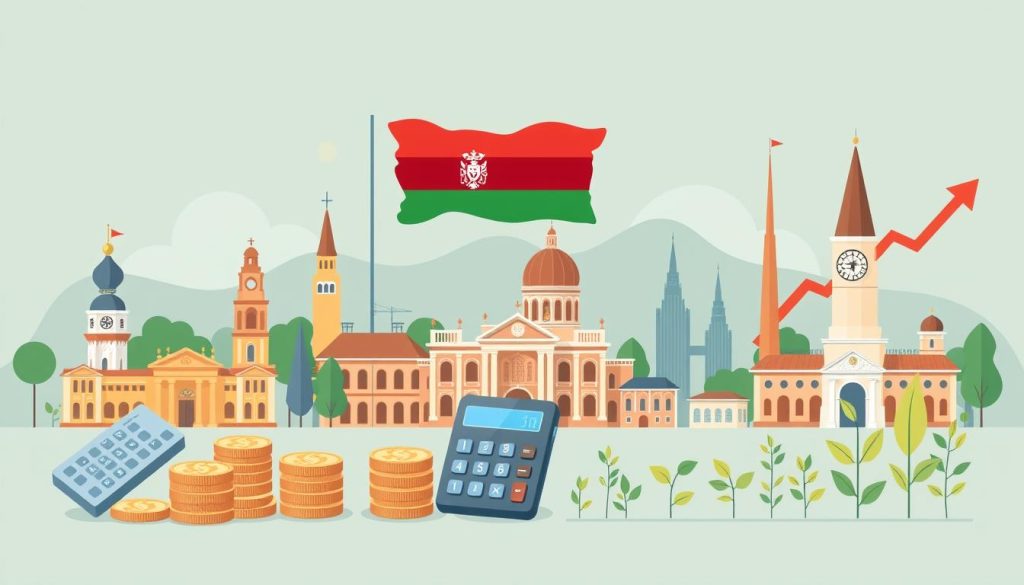Bulgaria is becoming a hotspot for entrepreneurs and companies looking to grow. This guide is here to help you understand the Bulgarian market. It will show you the good and the tough parts of starting a business here.
Knowing the local economy and rules is key to success. We’ll cover the important points to think about. This way, you’ll be ready for your business adventure.
Understanding the Bulgarian Market

The Bulgarian market is a mix of chances because of people trends, how they shop, and who they compete with. Being part of the European Union helps Bulgaria trade better, which is key for investments. Knowing these points is crucial for smart investment choices.
People trends show Bulgaria has a young and more city-dwelling population. This changes what people want to buy and use. Market insights show a focus on tech, green living, and quality, opening up new investment paths.
The competition in Bulgaria has changed, with more foreign investment coming in. Companies like the lower costs and Bulgaria’s spot between the West and East. The government also offers help to start new businesses and encourage innovation.
To get the Bulgarian market, you need to know its key parts. The mix of people trends, shopping habits, and Bulgaria’s good spot for trade offers big chances for investors. With good analysis and planning, people can make the most of this lively market.
Key Economic Indicators

For investors, knowing key economic indicators is key to understanding Bulgaria’s market. This part will look at GDP growth, inflation, and unemployment. It aims to give a clear view of the economic state.
GDP Growth and Trends
Bulgaria’s GDP has grown steadily, thanks to IT, manufacturing, and tourism. The government plans to keep this growth going by boosting tech and infrastructure. Investors should watch these sectors closely, as they are vital for Bulgaria’s economic health.
Inflation Rates
Inflation in Bulgaria is affected by both local and global factors. Energy price hikes and changes in what people want have caused inflation to swing. It’s important for businesses to keep an eye on these trends. This helps them understand how to set prices and make decisions.
Unemployment Statistics
The jobless rate in Bulgaria is falling, showing better job opportunities and skills. The focus on education and training is making the job market more competitive. This change is good for employers, so investors should consider how it affects their business.
Regulatory Environment for Investors

It’s key for foreign investors to know the rules in Bulgaria before starting a business. The first step is to register your business. This means following certain rules and providing the right documents. Sticking to these rules is vital for your business to succeed and be legal in Bulgaria.
Business Registration Requirements
Here’s what you need to do to register a business in Bulgaria:
- Pick a business type, like a limited liability company (LLC) or joint-stock company.
- Write the founding documents, like articles of association.
- Open a bank account to put in the minimum capital needed.
- Send in your registration to the Bulgarian Trade Register with all documents.
- Get your unique ID code and VAT number, if needed.
Several government bodies check these registrations. They make sure everything follows Bulgaria’s laws.
Key Regulations Impacting Foreign Investment
Bulgaria has rules to help and protect foreign investors:
- Rules to encourage foreign investment and attract international businesses.
- Laws to protect property rights and keep contracts safe.
- Incentives in different areas, like tax breaks and grants.
Knowing these rules helps investors make better choices. It makes entering the Bulgarian market easier.
Doing Business in Bulgaria: An Overview

Starting a business in Bulgaria is a great chance for foreign investors. The country’s strategic position in the European Union is a big plus. It makes setting up a business straightforward, thanks to rules that welcome foreign investment.
The business culture in Bulgaria is a mix of old and new ways. Knowing these cultural details is key to success. Building trust and strong relationships is important in business dealings.
However, there are challenges for investors. It’s important to know about possible red tape. Getting help from local experts can help avoid problems with rules and operations.
- Ease of establishing a business entity
- Access to a skilled workforce
- Developing connections within local industries
Legal Framework and Corporate Law

The legal system in Bulgaria helps various business types. It’s key for investors to know the different business structures. Each has its own benefits and challenges, affecting how a business is set up.
Types of Business Entities
In Bulgaria, there are several main business types. Each meets different needs. The most common include:
- GmbH (Limited Liability Company): Offers limited liability for its owners, making it a popular choice for small to medium-sized enterprises.
- Joint-Stock Companies: Suitable for larger businesses looking to raise capital through shareholders.
- Partnerships: Provide flexibility but result in shared liability among partners.
Each structure has its own rules and tax rules. This shows why it’s crucial to know corporate law Bulgaria when picking a business type.
Corporate Governance
Strong corporate governance is key in Bulgaria. It helps companies run responsibly. Important areas include:
- Compliance: Following local laws and international standards is crucial for legal integrity.
- Accountability: Companies must be transparent and hold management accountable to stakeholders.
- Stakeholder Engagement: Regular communication with stakeholders builds trust and supports a sustainable business environment.
By focusing on corporate governance, businesses can improve their reputation and work better in the Bulgarian market.
Foreign Direct Investment (FDI) Landscape

FDI in Bulgaria has seen a rise in recent years. This shows the country is becoming more appealing to foreign investors. The investor scene is lively, with many sectors catching the eye of international companies.
The tech, manufacturing, and renewable energy sectors are leading the way. They are drawing in a lot of foreign money.
The government is working hard to make Bulgaria more attractive for investors. They offer tax breaks, make things easier to do business, and support new ideas. This has made Bulgaria a strong choice for investors in Europe.
Big foreign companies are playing a big role in FDI. They help the economy grow and set high standards. Their success shows Bulgaria is a great place for foreign investment.
Taxation in Bulgaria

The tax system in Bulgaria has rules that businesses must follow. These rules affect their money plans and success. It’s key for both local and foreign investors to know the tax rules to make money in Bulgaria.
Corporate Tax Rates
Bulgaria’s corporate tax rate is just 10%. This is one of the lowest in the European Union. It helps businesses make more money than in other EU countries with higher taxes. This good rate helps local businesses and attracts foreign investors.
Value Added Tax (VAT)
The VAT in Bulgaria is 20% for most things. But, some sectors like hotels pay only 9%. Knowing about VAT helps businesses plan their finances better.
Incentives for Investors
Bulgaria has special offers for foreign investors. These include tax cuts, grants, and other financial help. These benefits are for businesses in key areas like tech, energy, and building. They help lower costs and make businesses last longer in the market.
Sector Opportunities for Investment

Bulgaria has many investment sectors with great growth potential. You can find chances in IT, agriculture, and renewable energy. Each one adds something special to the economy.
IT and Software Development
The IT sector in Bulgaria is growing fast. It’s thanks to a skilled workforce and a lively start-up scene. This area is not just good for IT jobs but also attracts big tech companies.
Top universities in Bulgaria produce tech graduates. This makes the country a key place for digital innovation and software development.
Agriculture and Food Production
Agriculture in Bulgaria is also a big deal for investors. The country has rich soil and a good climate. It exports traditional products like rose oil and organic foods.
There’s also a growing interest in sustainable farming. This opens up new investment chances in eco-friendly farming and organic certification.
Renewable Energy Sector
Bulgaria’s renewable energy sector is booming. This is because of growing awareness of climate change. The government supports green investments, helping projects in solar, wind, and biomass energy.
Investing in this area can be profitable and good for the environment. It helps meet global sustainability goals.
Labour Market and Employment Laws

The labour market in Bulgaria is complex, shaped by employment laws and workforce traits. It’s vital for investors and businesses to grasp these dynamics. The legal framework for employment in Bulgaria covers many regulations. These show the country’s stance on worker rights and what employers must do.
Labour Policies and Regulations
Bulgaria’s employment laws, including rules on contracts and workplace rights, form a strong base for the labour market. Important points include:
- Employment contracts must be in writing and detail wages, working hours, and duties.
- Workers have rights to annual leave, sick leave, and protection against unfair dismissal.
- Employers must follow rules, like paying into social security and health insurance regularly.
Workforce Characteristics
An in-depth look at the workforce shows unique traits of the local population. These traits can greatly affect hiring. Key points are:
- Many graduates, especially in IT and engineering, are found in the workforce.
- The skills available match market needs, especially in tech and services.
- The workforce is young, making it vibrant and adaptable.
Building a Business Network in Bulgaria

Creating a strong business network in Bulgaria is key for investment success. The local market values connections highly. Investors must engage in effective business networking in Bulgaria. This section will cover various networking opportunities and resources for investors in the area.
Networking Opportunities
Many events and platforms offer great chances to network. They help investors work together. Key places include:
- Industry conferences that show off new ideas and trends.
- Workshops and seminars by investor associations.
- Local business meet-ups to build relationships and find collaboration chances.
Going to these events can grow your professional circle. It also gives you a peek into the Bulgarian business world.
Portals for Investors
Investors have access to many resources and online platforms. These help get important info and connect with others. Portals support investor groups and offer tools for the Bulgarian investment scene. Notable ones are:
- Investment advisory websites with market analysis and connections.
- Networking sites for direct communication between investors.
- Online directories with local businesses and services for investors.
Using these resources lets investors find many collaboration chances. It also helps them fit into the local market smoothly.
Cultural Considerations in Bulgarian Business

Knowing the cultural nuances is key to building strong business ties in Bulgaria. Understanding local customs can make your interactions smoother. It’s important to grasp the business etiquette and customs to move well in the professional world.
Business Etiquette and Practices
In Bulgaria, being professional means showing respect and courtesy. Being on time is crucial, as being late is seen as rude. Greet people with a firm handshake and keep eye contact to show you’re sincere.
When talking, being direct is good, but also be diplomatic. Talking about personal things can help build a strong business relationship. Knowing these etiquette rules can help you build trust and make your interactions easier.
Understanding Local Customs
Local customs in Bulgaria show the country’s rich traditions and values. Personal relationships are very important, so building a genuine connection is key before discussing business. Negotiations can take time as both sides work to build trust.
Being patient and flexible in agreements can help. Knowing about Bulgarian hospitality can also improve your chances of success in business there.
Access to Finance and Investment Capital

Bulgaria offers many chances for businesses looking for investment capital. The banking sector and other funding sources provide services for all types of businesses. This includes both big companies and new start-ups.
Banking System Overview
The Bulgarian banking system has several important banks. UniCredit Bulbank, DSK Bank, and Raiffeisenbank are among them. They offer loans, credit lines, and investment products.
These banks help businesses by making it easier to get finance. They do this with good interest rates and custom financial solutions.
- Comprehensive loan offerings for various business needs.
- Investment advisory services for strategic financial planning.
- Support for foreign investors through specialised financing options.
Funding Opportunities for Start-ups
Start-ups in Bulgaria have many ways to get funding. Venture capital firms and angel investors help new businesses grow. They provide the money needed for start-ups to expand.
Government programs also help start-ups. The Bulgarian Small and Medium Enterprises Promotion Agency offers financial support. This support is for innovative start-ups.
- Venture capital firms focus on high-potential sectors, offering equity funding.
- Angel investors provide not only capital but also mentorship and industry connections.
- Government programmes often feature grants and co-financing options to stimulate entrepreneurship.
Challenges of Doing Business in Bulgaria

Starting a business in Bulgaria comes with its own set of challenges. Foreign investors face hurdles like complex bureaucracy and cultural differences. These can affect how well a business does.
Bureaucratic Hurdles
Investors often find the bureaucratic processes in Bulgaria to be complex. Getting the necessary permits and approvals takes time. This can slow down projects.
Some common issues include:
- Lengthy processes for company registration
- Complicated tax compliance requirements
- Frequent changes in regulations that can affect operations
It’s important to understand these challenges. This way, investors can manage their expectations and follow the rules.
Cultural Barriers
Cultural differences also present challenges. Knowing local customs and business etiquette helps avoid misunderstandings. Key cultural factors to consider include:
- Communication styles, which may vary from what investors are accustomed to
- Decision-making processes that may appear indirect
- Building relationships, which is crucial before engaging in business negotiations
Being aware of these cultural differences can lead to better business interactions. It can also increase success in the Bulgarian market.
Success Stories of Foreign Investors

Bulgaria is now a top choice for foreign investments. Many international companies have found success here. Their stories show how different strategies can lead to great results.
A big tech company set up in Sofia, thanks to Bulgaria’s skilled workers and low taxes. This shows how important it is to do your homework and work with locals. It helps businesses understand and follow the rules.
A major farm company also came to Bulgaria, drawn by the land and weather. They grew by working sustainably and with local people. This shows the potential in Bulgaria’s farming sector.
Every story of investment shows how flexible and smart foreign investors can be. They learn to fit in with local ways. These stories highlight how smart investments can change lives and boost the Bulgarian economy.
Future Trends in the Bulgarian Economy

The Bulgarian economy is set for big changes, with many sectors ready for growth. Investors should watch the trends in Bulgaria, especially in new markets. Several key areas are promising for big economic growth, changing the investment scene in the country.
Emerging Sectors
Bulgaria is working hard to attract more foreign investors. Several sectors are expected to lead the way in the next few years. These include:
- Information Technology: Bulgaria is becoming a key place for software development and IT services.
- Sustainable Energy: The focus on renewable energy is growing, matching global green goals.
- Tourism: Bulgaria’s culture and nature are boosting tourism, offering great investment chances.
Government Initiatives for Growth
The Bulgarian government is pushing for economic growth and more foreign investment. They are doing this through several key actions. These include:
- Tax breaks for businesses in key sectors.
- Investing in infrastructure for new markets.
- Support for research and innovation to drive tech progress.
Practical Tips for Investors
When looking into investment opportunities in Bulgaria, doing thorough research and getting local insight is key. A top tip is to build strong connections with local partners. This helps with smoother transactions and better understanding of the market and culture.
Another important piece of advice is to use the help of Bulgarian government agencies and investment boards. They offer guidance on rules, funding, and incentives. This can greatly impact your investment plan. Working with them can also keep you updated on the Bulgarian economy’s trends and chances.
It’s also vital to keep up with industry rules and market changes. Joining local business events and conferences is a good way to get insights and network. By following these tips, investors can boost their chances of success in Bulgaria’s dynamic economy.

